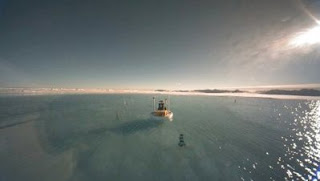Yes, that's the North Pole. It's now a lake.
In part the study concludes that "Sea ice is home for algae and plankton, which together produce 57 per cent of all the food in northern oceans. These primary producers are dependent on sea ice as their habitat underpin the entire marine food web of the Arctic." Going on to say that the effects of sea ice loss wind all the way through the ecological system from the tinyest microbe to the top predators. Oceans warmed after losing their sea-ice cover also are expected to promote warming permafrost as far as 1,500 kilometres inland. The accelerating loss of sea ice and warmer tundra is expected to lead to an earlier spring growth, disrupting the delicate timing the entire interrelated eco-sphere.
Activists and groups like Greenpeace have been warning us for decades that the climate change impacts on all Arctic lifeforms including wildlife would be far greater than the overly conservative projections of climate science. The Arctic biosphere, like all others, is a highly complex interrelated web. Unfortunately the simplified models that our scientists use are so crude they seldom, if ever, are reliable as anything more than a tool for suggesting further areas of interest to be studied.
Another factor that confounds model based analysis is that today's climate change is happening 10X faster than any climate shift ever recorded. "We know from past changes that ecosystems have responded to a few degrees of global temperature change over thousands of years," Noah Diffenbaugh, an associate professor of environmental Earth system science, "But the unprecedented trajectory that we're on now is forcing that change to occur over decades."
The terrifying rate of global warming is already having an impact on the spread of infectious diseases across the world, in most cases resulting in an increase of disease and parasitism. University of Georgia Professor Sonia Altizer says, "As global warming changes ecosystems across the world, disease hosts, as well as parasites, undergo changes as well. For example, as temperatures climb in the Arctic, parasites develop more quickly leading to greater infection rates for their hosts." [Oh Goody, ed.]
Apparently Greenland’s ice sheets have disappeared far faster than climate models predicted recently. Climatologist Jason Box has a 'radical theory' of why, called the Unified Theory of Glaciology. It explains how tundra fires in Canada, massive wildfires in Colorado and pollution from coal-fired power plants in Europe and China sent an unexpectedly thick layer of soot over the Arctic region last summer, which settled onto Greenland’s vast frozen interior, increasing the amount of sunlight the snow and ice absorbed, which in turn accelerated the melting.
The idea that soot can have a powerful effect on the melt rate of snow and ice is not new. The godfather of global-warming science, James Hansen, explored the idea in a paper published in 2003, arguing that if soot reduced the reflectivity of Arctic ice by just two percent, it had the same effect on the melt rate of the glacier as a doubling of CO2 concentrations in the atmosphere.
Each of these studies show that we are immersed in an interconnected whole. The lake forming at the North Pole in the picture above is one part of the same whole as the extreme weather events all over the globe, as are the rising oceans, the dying corals, the chunky air over urban areas, the wildfires, the droughts, the floods, the melting glaciers and sea ice...we are all connected. There is only one life, we, the flora, fauna, microbes, minerals, forces and faeries share it. We all have the personal responsibility to protect this one life we share by rejecting materialism, by living simply, by wanting and demanding less.



